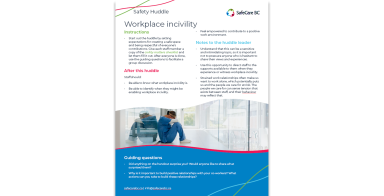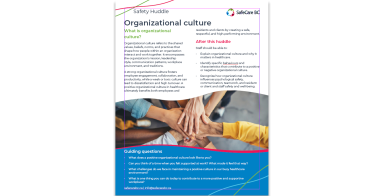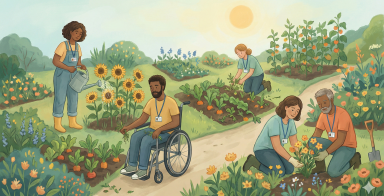After this huddle, staff should be able to:
- Define civility and respect within the context of daily work.
- Discuss how uncivil behaviour impacts team well-being and resident or client care.
- Recall strategies to respond constructively to disrespectful behaviour.
How to run the safety huddle
As the huddle leader, do the following:
- Before the huddle, review the huddle content and huddle leader notes.
- Have resources ready, such as policies, employee assistance programs, or SafeCare BC resources.
- Choose a scenario that fits your workplace and read it aloud.
- Use the guiding questions to lead the discussion.
- Use huddle leader notes as support while leading the discussion.
- Keep the discussion short to about 5-10 minutes.
Definitions
Civility and respect mean treating everyone in the workplace with kindness, dignity, consideration, and courtesy, regardless of their role or background. It involves active listening, valuing different points of view, and communicating in a helpful way, even when we disagree.
Scenario for long-term care
It is a hectic morning at the care home. Sarah, a care aide, feels the pressure of being short-staffed and is rushing to complete her morning routine. She is doing her best, but she is running behind on her tasks.
As she hurries down the hallway, another care aide, Kim, approaches her. Kim looks frustrated and stops Sarah in front of a resident and their family.
“You’re behind schedule again, Sarah,” Kim says loudly, pointing toward Sarah’s cart and the room list as if to prove her point.
Sarah’s face turns red with embarrassment. She feels demoralized being called out so publicly, especially by a peer. The resident’s family looks uncomfortable, and Sarah can feel her stress rising, making it harder to think clearly and stay calm.
Sarah isn’t sure if she should defend herself in the moment, ask Kim to step aside for a private conversation, or say nothing and keep moving.
Guiding questions for long-term care
- How did Kim’s behaviour in this moment impact Sarah, the resident, and the family?
- How could Kim have handled the situation differently while still addressing the schedule delay?
- If you witnessed this interaction, how could you support Sarah afterwards?
- How can we address disrespectful behaviour when we experience it?
Facilitation tip: Participants may focus too much on a colleague’s error. Validate that public criticism is hurtful, but guide the group to also discuss how the team can recover from such moments and support one another when stress is high.
Scenario for home care
Anika, a community health worker, has just joined an established home support team. During her first team meeting, she shares an idea for organizing client documentation differently to save time.
Liam, a colleague, nods in agreement, but Parveen, another team member who has been on the team longer, shuts it down right away. Parveen sighs and says, “That’s not how we do things here, Anika. We don’t need to change what works.”
Anika feels a wave of discouragement. The room, which felt collaborative a moment ago, now feels tense and unwelcoming. A couple of people avoid eye contact. Liam looks like he wants to say more, but doesn’t.
Guiding questions for home care
- How did the team’s response to Anika’s suggestion impact her sense of belonging?
- How could the team have responded differently to foster a more welcoming environment?
- What common behaviours might make new team members feel excluded or undervalued?
- How can we ensure everyone feels comfortable sharing their ideas, regardless of their experience level?
Facilitation tip: Watch for “us vs. them” dynamics (new staff vs. experienced staff). Encourage the group to consider how to be inclusive allies who bridge that gap rather than widen it.
Huddle leader notes
- Create a safe space:
- Listen, respect all views, and be mindful of others’ challenges.
- Guide the discussion to focus on what participants can control.Move the conversation from complaints to solutions, strengths, and helpful actions.
- Invite anyone with specific concerns to talk with you after the huddle.
- Key discussion points: Use the objectives and key discussion points below to guide the huddle if needed.
- Empathy: Emphasize the importance of empathy and understanding in the workplace.
- Shared responsibility: Remind everyone that creating a positive workplace culture is a shared responsibility.
- Support: If complex stories emerge that you cannot navigate, refer colleagues to existing support, such as the Employee and Family Assistance Program (EFAP) or Care to Speak.
- Sharing: Encourage participants to share strategies for fostering a respectful environment.



























